From A Close Friend of Lorenzo
What I wrote days later
Subject: with regards to last events
Very beloved all:
I took a time of duty to have the pleasure, to greet you in writing, as I had much enjoyed for several years – because communicating is also a duty. Time has been prudential – the imprudent I had been. I lament that the silence has been so long.
I greet you with joy and nostalgia from Playa Grande, the head of the municipality of Ixcán, in the department of Quiché; Playa Grande is also where our parish Christ Redemptor is located.
Not on the Paschal of Jesuscrist, Our Lord, as when I began to write this email, but in Pentecost’s vigil, the great feast of the missionary Church – as a kind of birthday celebration, commemorating that the Spirit of Jesus is the one who sent us forth, to mission, to be witness of resurrection, to announce to all creation that life triumphs over death.
I was at ‘ Adam’s Paradise ‘ today, see of the Multiethnic Missionary Center of our parish, with Cremilda, Franciscan cathequist Sister from Brazil, and with Juan Venne, our beloved Juan, a Canadian volunteer with the Oblates for almost ten years, when it occurred to me to turn on my telephone – this was during lunch. There, I got, with surprise and joy, Emilio’s voice message.
On Monday 18th of May, I left with Juan Venne, director of the OMI’s vocational home here at Playa Grande, heading to Cobán. We left around 6:00..While at Cobán we ran some errands and did some shopping – some of then were groceries for the Oblates in Guatemala who we will meet in Playa Grande late afternoon- early evening. During lunch time, I called Jean Claude(47) who told me that not all Oblates were coming, but only five: Rodrigo (±77), Kapustka(73), Rubén(73), Lorenzo (74 two days ago) and Jean Claude himself. He told me they were leaving Cobán at that moment – and I, having lunch in Cobán, realized I would leave and arrive an hour after them.
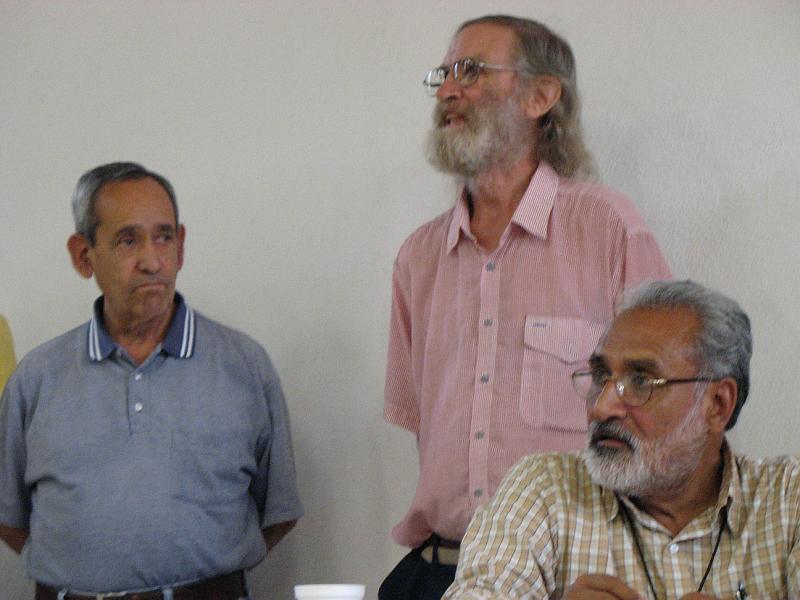
We arrived at the protected area of Laguna Lachuá around 18:30. I saw a police car and several motorcycles in a place, and although it attracted my attention to see so many motorcycles together (maybe five), I did not pay too much attention and we continued on. A few minutes ahead I stopped the car (yes, here they are called CAR) at the sanitary inspection post. I got off for the inspection and the dud surprised me saying: “Father, rush to the hospital, the priest’s bus has just passed by . . . . with an injured person on board.” At that moment I got on the car and shouted to Juan (poor Juan!) to get on, that was urgent to leave. I had a call (blessed cellular phones . . . that in this particular evening more than ever we used them): it was José Manuel, the parish priest.
“They assailed the priests, they killed Lorenzo, Jean Claude is injured, let go to the hospital!”
I went full speed – 60, which is the fastest you can drive on these roads – to the hospital that was 2 minutes away. I got there 2 minutes before José Manuel and the others.
At the entrance of the hospital I encountered Kapustka, standing up at the back of Oblates’ bus (when I write BUS please read VAN). But it was not the usual Kapustka: it seemed thin (although he is not), with a foolish face (he is not) with a large blood stain in his belly, on its normally spotless guayabera shirt. He was serene – and altered at the same time.
I greeted him and asked what happened, and said to me with altered serenity: “They assailed us, killed Lorenzo and JC is injured. We got on the bus again and Rodrigo brought us to the hospital.”
I noticed that Lorenzo’s body was on the bus, cover with a throw. I briefly greeted Rubén and Rodrigo, and got into the hospital to see JC: he seemed asleep, or at least he intended to rest and I did not disturb him. I immediately got informed: his wounds were not serious, neither vital organ was passed through nor touched bones, he was in stable condition.
José Manuel arrived along with Carlos (a former Oblate reincorporating to our ranks), I called Félix and Cruz who were on their way, to tell them, without letting them know, to come to the hospital and not to town.
In summary, in little time we all were there. Confused, sad, upset, and making decisions. I immediately realized that one of us had to go with Jean Claude (and make decisions), and another one had to stay at Playa – and make many more decisions, and deal with police, doctors and the Attorney General agents. We had not much to choose from: the aged were not to make decisions and the young . . . realizing that Cruz y Félix were foreigners, José Manuel and I were the only left. We decided José Manuel stayed in Playa Grande and that I’d travel to Cobán with Jean Claude. I left with three policemen in their car and with an uncomfortable and dazed Jean Claude – dazed and conscious (if it is possible). On our way, very near to the attack place, I saw a crocodile – I mentioned it because I was very much impressed: I was always looking for them and had never got to see them, and this sad evening, without looking for it, it crossed in front of us.
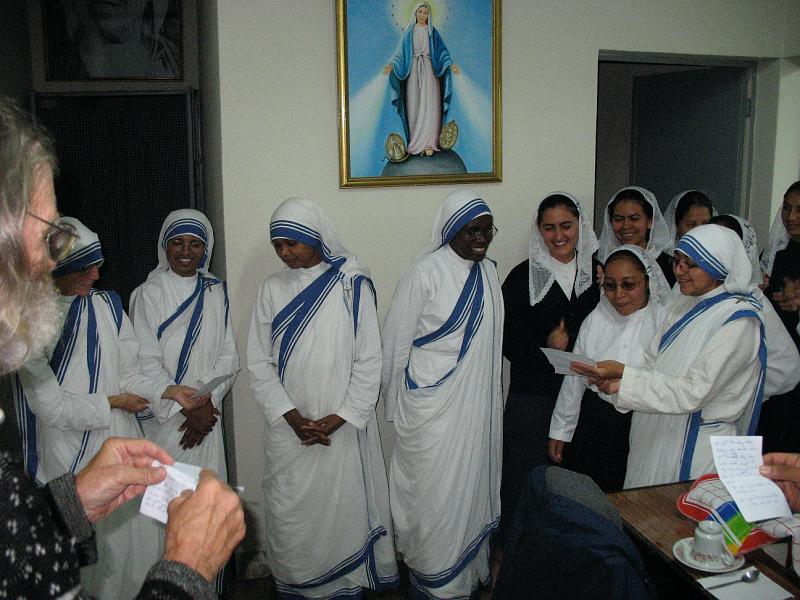
During our way to Cobán I got many calls – so many that the cell phone battery went dead. We got to the National hospital of Cobán, where we were waited for. Jean Claude got there well; however, with high blood pressure: in the end, I had the tasks of accompany Jean Claude, eventually take him to the Capital, and arranged with the US embassy Lorenzo’s theme. The Oblates have the tradition to bury our brothers in the country they died.
It has to be said that Jean Claude is a man of relations, and surely in a year and a half that he has been in Guatemala, he knows more ‘important’ people that all others Oblates combined. By late evening, Lorenzo, Jean Claude and the Oblates were National news (I don’t know how many times, those days, I heard ‘I watched you on TV, you were on TV, you appear on TV, have we met before?). To make a long story short, Jean Claude was stabilized at hospital in Cobán, and although he was offered (military) air transportation to the Capital, I managed to get an ambulance from the voluntary firemen to go on ground – given he was not dying – and we decided to accept the small plane offer to take Lorenzo’s body and the aged Oblates to the Capital.
They say that here in Playa, two Masses were offered for Lorenzo – packed to the fullest. There are people who say they didn’t know there were so many cars in Playa: lots of people. I missed it, because I am one of those who need to be hugged and dandled. And it was that Lorenzo was here from 1993 to 2000. It was possibly the first time he worked with indigenous people in a formal manner. It was surely the first time he worked in a parish in a long time. Those were difficult years, years at war, of peace processes, years of lynching . . . and here he was the good Lencho (nickname for Lorenzo).
On arriving at Cobán’s hospital I was surprised by Cecilia Beb, Juan Beb’s daughter, and catechist in our parish. I knew she was in the Cobán taking care of her husband who had a motorcycle accident. Cecilia approached me crying and hugged me as if Lorenzo were her dad – or my dad. I was hugging her, and also saw the people looking at us with faces as saying “what is this cabanera hugging the gringo as if they were family” – and of course, very few knew it was so, we were family, and that we needed that hug very much – both of us. Surely she had many memories of Lorenzo when he was in Ixcán.
Journalists, in general, were cool. I had, moreover, the good fortune to have met one of them a few months before in Ixcán. He was really good, he covered the news – but very discreet. Moreover he placed himself to my orders, and helped me to get the ambulance. I still owe him my gratitude.
Also, the medical personnel were very kind. It’s a National hospital as you would imagine – or maybe not. The fact was they got me a stretcher and a little throw, and there, at the emergency room, I slept by Jean Claude. I was tented to disconnect the monitor, but resisted.
All along, Jean Claude was always somehow tired, but always in good humor. Some journalists got closer to him and wanted to ask him things. I don’t understand how the doctors allowed them to pass . . . I requested them not to be mean, and that at least allow me to ask the priest if he wanted to be interviewed. And he said yes . . . and he was very funny. You see:
“Father: What is your name?”
“Jean Claude Ngoma”
“Father Llangló: how do you write it?”
“it is written F A T H E R.”
(and they looked to each other, frustrated, with a face of: “this Niger just fuck us and we are on air”)
Tuesday 19
Some journalists scold me by cellular phone – and also some of the fan club of father Jean Claude. I don’t blame them – must of all the second ones. I think I was nice with everybody. There was a case, however, the one of Radio University…. Having arrived to the capital, he called me – one wonders how they find the numbers. I ask him to call in ten minutes. Called again and I ask him for the patience of ten. At ten - or less, says the voluntary fire man who drove the ambulance to the capital city and says to me: “Father it is for you”. It was the guy from RadioU, and asked me what happen?
Upset and without patience, with a police man tone (I can do it very well maybe because of the Temistocles) I gave him a short description of the events. After that, Fulanovish ask me: “What do you ask, what do you demand from our authorities?” I felt harass, hound… I felt that I have already answered the same questions around thirty times – although maybe were only six – I answer immediately and without thinking: “the same as you.”
Because he didn’t expect that… his tongue got entangle… he gave thanks and finished.
That afternoon a friend of Jean Claude took me home and ask me to have a bath and go to sleep. I took a bath and went to the parish. I have already missed Lorenzo’s funeral at Ixcán, and I would not miss the one at Guate. I arrived into the Church… it was completely full. I ran into a lot of people that I recognized, some whom I had a very long time without seeing them.
Interesting was that we meet with a lot of people unknown for us – it was Lorenzo’s people. The missionaries of the Charity, the people from the home of children’s with HIV, people from the general hospital, people from the REIKI group… everywhere full.
Even the Cardinal, with whom we have had lately difficult times, was present (of course, just in case, I believe that the journalist and the popular talking are devouring him again).
We celebrate the Mass Tuesday night. There was somebody to preside it but to preach was on me. Truly a feel very close to Lorenzo. I have always felt like that, and almost with certainty I could say that I feel more close to him that to any other of the Oblates in the province.
The next day we had the Mass of the last good bye, presided by the Bishop of Quiché. Also accompany us the Apostolic Nuncio and the Bishop of Jalapa, who was for many years the Bishop of Quiché and with whom the Oblates worked for many years. Vicente Louwagie made the homily – and I think that has been one of the best homilies that I have heard in my life.
Truly there are many things to be said about Lorenzo – and many that are very personal. The truth is that Lorenzo a shy, reserved and kind man, with big and bright blue eyes, the athletic type, very unique and brave, is a man that I have had admire for many years, and I feel blessed not just because I was able to call him brother, but most of all FRIEND.
I couldn’t write the must sad verses that night. These that I write are neither the happier, nor the more authentic. They could be, for sure, the more expected, the necessary ones, and the more therapeutic for this moment.
I have attached some files that I hope you can open.
I am deeply grateful for your prayers and greetings. And if you want me to borrow you a Saint, put your trust on Lorenzo Rosebaugh, which apart from Contemplative, jailed for preaching the peace and a man of great compassion, IS MY FRIEND.
A great hug, with all my affection.
hot, omi
P.D. I have some photos of Lorenzo: http://hipoomi.jalbum.net/Lorenzo/
From the 9 days walked: http://hipoomi.jalbum.net/Novena Lorenzo Rosebaugh/
Parroquia Cristo Redentor
Playa Grande, Ixcán, Quiché
14019 Guatemala, C.A.
Cel. (502) 4042 5065
Prayer
P. Lorenzo Rosebaugh OMI
May 16, 1935 – May 18, 2009
Man of God,
Consecrated to live like Jesus,
Impelled by the Holy Spirit
To be testimony and live the Gospel.
Friend of the poor,
The sick and the must abandoned:
Your life style happy and simple
Inspire us to always follow
The way of Peace and justice!
Misioneros Oblato de María Inmaculada
Parroquia Cristo Redentor
Playa Grande, Ixcán
Quiché, GUATEMALA, C.A.
Reports of Lorenzo’s Death
Friends,
We are still moved by the assassination of Father Lorenzo Rosebaugh, a North American priest from the Oblate Missionaries who was assassined at the Ixcán in the Quiché Region this past Monday May 18 around four o’clock in the afternoon. We are in shock because he is another victim of this violence that without a reason is beating the Country. Each day many persons continue to suffer, there are fifteen, twenty daily assassins; this tells us that we are in a violent Guatemala, however, we know that we are not violent, our people is not violent, our people is a peaceful people and because of that we need to build these peace and not allow to be defeated by few persons that seek the death, who enjoy the blood, who does violence against people especially the poor.
In the note that radio Quiché set in their webpage said that Father Lorenzo was heading to the capital city towards the parish of Cantabal in Ixcán with other four priests. The vehicle in which they traveled was intercepted by two armed man with balaclava helmets who signaled them to stop. They thought to stop, they preferred to be stripped of everything but of their lives, and before the car stopped, they started shutting from the front, this is the way that Father Lorenzo died and another missionary from Congo was injured. Father Lorenzo was missionary at the Quiché for several years, he was close to the people and with great humor; he put on boots to go into the communities in the years previous to the sign of peace, when the communities where experiencing a strong and repressive violence by the internal armed conflict in Guatemala.
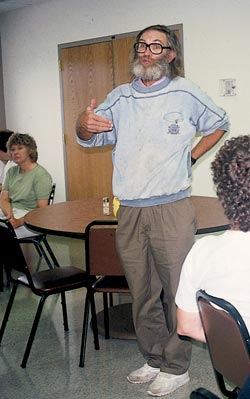
Father Lorenzo with his Oblate companions was heading to the Ixcán precisely to the parish of Christ the Redemptor, because there for the first time was to be held a reunion of all priest and clergy of the Quiché dioceses with Mario Molina Bishop of the Quiché. On Wednesday 20 in the afternoon they were to celebrate the Eucharist to commence the reunion, on Thursday the 21 they were to have a brunch precisely by the Lachuá lagoon and it is there, in that place where Father Lorenzo was assassinated.
In the Quiché Church are a great accountable number of martyrs from the obscure age of history of this Country, between them hundreds of catechumens and four priests, one of them father Guillermo Gutz who’s remains rest justly in the Ixcán.
To this witnesses faithful to God, father Lorenzo has been united with his bloodshed as a consequence of the violence that continues to beat Guatemala. Father Gerardo Ocapusta who also was traveling in the vehicle said that the Oblates as missionaries felt close in union with the Guatemala people who continue suffering much violence, one of his brothers was assassinated as there are assassinated every day many of our brothers, particularly the pilots of trucks and their helpers which have been victims since several days ago from this extortions and for the creation of a climate of instability, non-governability in the Country. It is sad that because some politic and economic interests, they are assassinating persons. The life of one person, of one human being has more value than all of the treasures of this world.
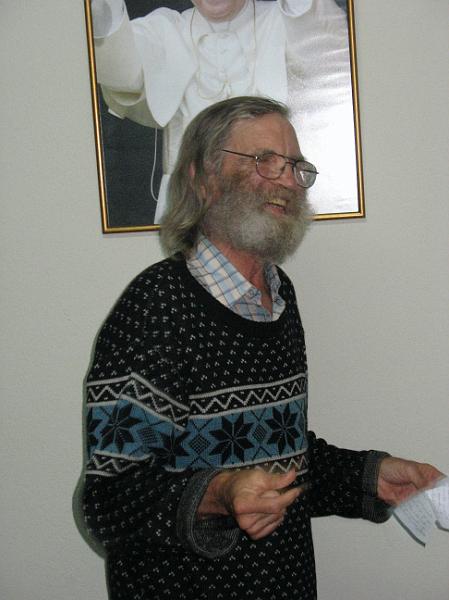
That is why it is important that we give testimony and develop a culture of peace, a culture of solidarity, that we transform the values with which are to be educated the new generations, not to promote anymore the competition but the collaboration, team work, community work, not to promote anymore selfishness but solidarity, to promote above all a culture of love in order to transform all the negative values which have been incrusted in the society as a byproduct, as a fruit of this death system in which we are now living.
Jesus testimony was precisely this, in the moment of his incarnation the Jewish people were under the Roman power and there was a great violence too, however, Jesus didn’t respond the way the Jewish of his time expected, organizing an army to defeat the Romans, but acted with the active no-violence. He acted with love, because love, solidarity, community, are the only ways that hatred, violence and death can be defeated, this is Jesus’ call today, to talk about love but most of all to practice love, to talk about solidarity yet to practice solidarity, from the little things to the great things. Let us pray, pray much for peace, but we ought to be builders, artisans of peace.
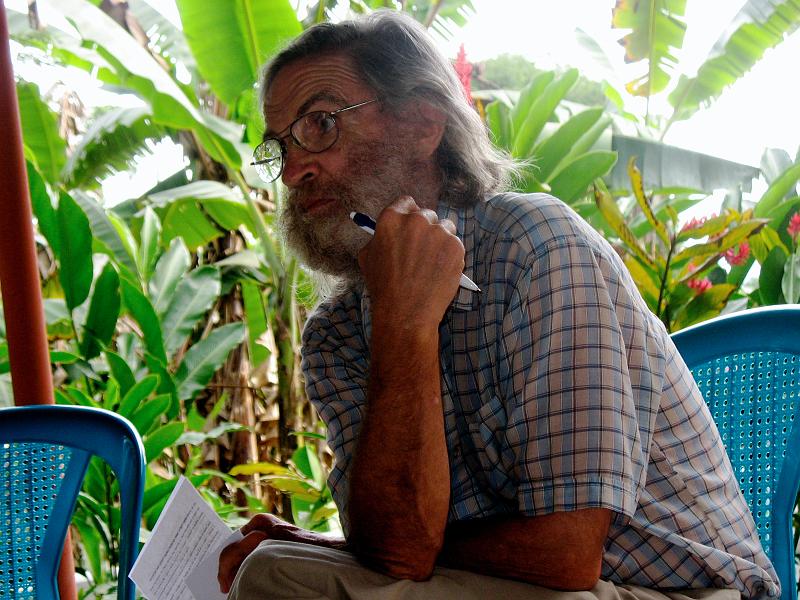
We give thanks to father Lorenzo for all his effort, for his life that he wear away with the poorest and needy people of Guatemala, we give him thanks for his stronghold testimony, because being an aged person, 73 years old, he drove his bicycle in order to go to the hospitals to visit the sick and to celebrate the Eucharist, we give him thanks for being devoted to us, for his love, and we ask him that being now at the side of Jesus, to intercede for us, so that we really know how to be builders of peace.
Father Lorenzo until we meet in the Kingdom.
Pictures from the 9 days walked in memory of Lorenzo